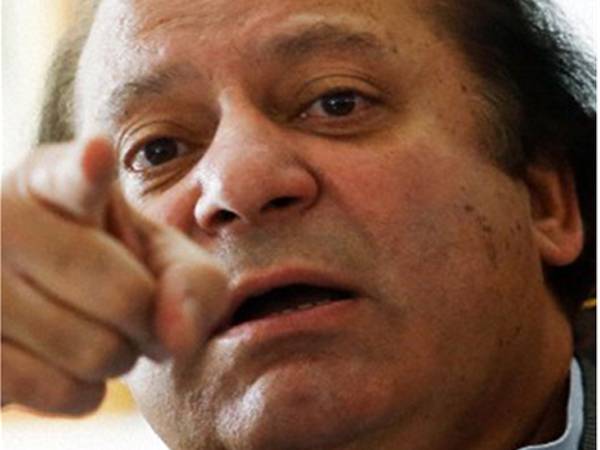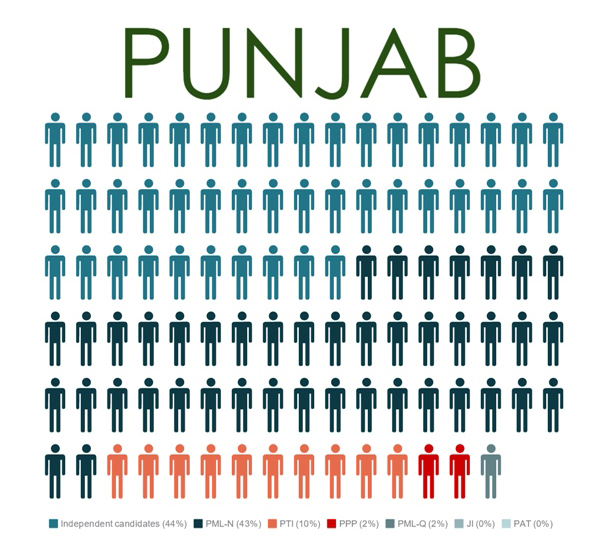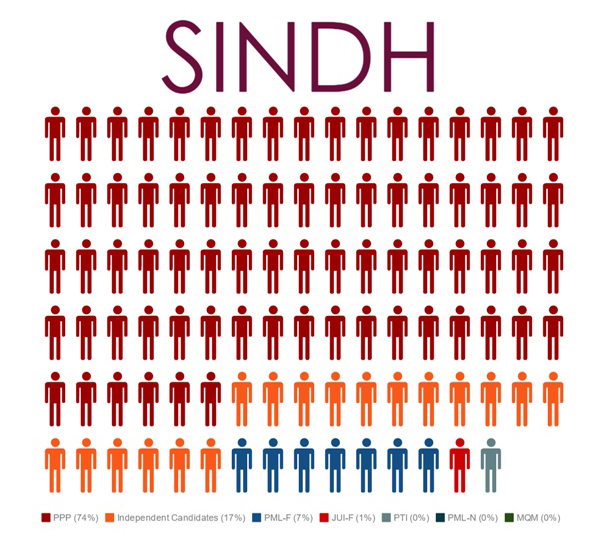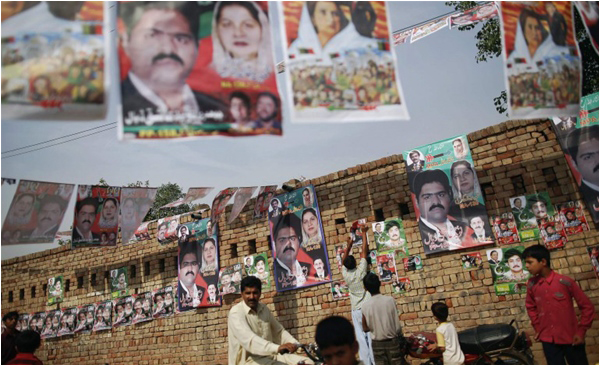
 On October 29, two days before the first phase of the local council elections in Punjab and Sindh, the Election Commission of Pakistan (ECP) released a statement listing ‘highly sensitive’, ‘sensitive’ and ‘normal’ polling stations in both the provinces. Of the 16,266 polling stations in twelve districts of Punjab, 3,551 were declared ‘highly sensitive’.
On October 29, two days before the first phase of the local council elections in Punjab and Sindh, the Election Commission of Pakistan (ECP) released a statement listing ‘highly sensitive’, ‘sensitive’ and ‘normal’ polling stations in both the provinces. Of the 16,266 polling stations in twelve districts of Punjab, 3,551 were declared ‘highly sensitive’.That may be a reason why the voter turnout was lukewarm. Punjab Election Commission’s Masud Ahmad Malik put the figure at 40% to 45%. There were fatal clashes across Sindh and Punjab vindicating the ECP’s pre-poll warnings. The most high profile incident was a gunfight between workers of Pakistan People’s Party (PPP) and Pakistan Muslim League-Functional (PML-F) in Khairpur, where 12 people died.
It has been a decade since the last local elections in Punjab and Sindh. The two provinces took longer than Balochistan and Khyber Pakhtunkhwa to put a local council system in place. Analysts say a lack of belief in the new system’s powers may be another reason behind the lukewarm turnout.
“Shahbaz Sharif does not like delegating powers,” said Pakistan Muslim League-Quaid (PML-Q) leader Chaudhary Shujaat Hussain on the Election Day. “Those who win in local government polls will have to stage a sit-in to wrest powers.”


“My mother is a strong PML-N supporter, and has always voted for the party,” said Faraz, a Lahore-based doctor from the UC-114 constituency. “But even she didn’t bother to get up and go out to vote in these elections.” She believes the local councils are powerless, he said.
Her lack of interest proved costly to the party she supported. Pakistan Tehrik-e-Insaaf (PTI) won the UC-114 election. But the Pakistan Muslim League-Nawaz (PML-N) dominated the elections in Punjab. It bagged 1,192 of the 2,696 seats in the province, while PTI – generally considered the PML-N’s main challenger in Punjab – won a mere 285.
Punjab government’s spokesman Zaeem Qadri insists all local matters are, and will continue to be, the concern of local governments. “There are checks and balances,” he said, “and they are pivotal for accountability.”
Voting was stopped for 90 minutes when the prime minister arrived
“This question of authority should have been raised when the local government act was passed,” said political analyst Dr Ali Cheema. “Even so, what is happening is that members of the same political party are competing for authority. In the long run, the elected members will be pressured by their constituency to perform, which could force the local governments to strive to enhance their powers.”
One example of this intra-party rivalry was seen in Faisalabad’s UC-116, where supporters of Punjab Law Minister Rana Sanaullah clashed with those of State Minister for Water and Power Abid Sher Ali, accusing him of election rigging. The traditional rivalry between the two PML-N leaders had been simmering ahead of the polls in the crucial city of Faisalabad.
Zaeem Qadri said Prime Minister Nawaz Sharif had the final say and he would resolve the matter.
Voting had to be stopped for an hour and a half in Lahore’s UC-70, the constituency of Nawaz Sharif, because of heightened security as the prime minister arrived to cast his vote. “I had to wait over two hours,” said Zubair, a voter from the constituency. “My friends were stranded in a mosque near the polling station, they weren’t allowed to come out because of the security protocols,” he said. “It was very frustrating.” He said he planned to vote for PML-N’s Muhammad Ali Dogar, “but seeing this monarchical behavior, I voted for an independent candidate.” Dogar won the seat for PML-N.

But the party lost in both the UC-245 and UC-246 constituencies in Lahore’s Christian majority areas in Lahore, including Youhanabad. The two union councils fall in Chief Minister Shahbaz Sharif’s provincial assembly constituency, and are still reeling from the aftermath of a coordinated terrorist attack on two churches in Youhanabad, the lynching of two people after the incident, and the ensuing province-wide unrest.
“What else do you expect after the Punjab police arrested more than 250 Christian children following the incident, and released them without charges after torturing them for two days?” says journalist Emanuel Sarfaraz. “There is severe resentment in the Christian community, especially in Youhanabad, who feel that the government didn’t handle the incident well, and treated the Christians unfairly.”
The minority Ahmadiyya community boycotted the elections after the ECP published a separate voters list for its members. Saleemuddin, the spokesman of the Ahmadiyya community in Pakistan, condemned what he called the government’s blatant discrimination, saying it was the “worst example of religious hatred and discrimination, attempting to single out patriotic Ahmadis from national stream.” He said the community had “informed the government in writing and the Election Commission in a formal meeting, but no positive step was taken in this regard.”
"Shahbaz Sharif does not like delegating powers"
A 27-year-old Ahmadi software engineer from Lahore said he was interested in politics but did not vote. “I am PTI supporter, and have attended all of the party’s rallies in Lahore,” he said. “I was even part of the sit-in at Lalak Jan Chowk in Defence. I always ask other people to vote for PTI, but I will personally never vote until the government ends this discrimination.”
He said a strong PTI was crucial for national politics, to keep the ruling PML-N on its toes even if it did not win in the elections.
PTI’s Punjab president, Chaudhary Sarwar, said his party was competing against the administrative machinery as well. “In many areas, the SHOs were forcing people to vote for PML-N,” he said.
“These are typical PTI lies,” Zaeem Qadri responded. “Making accusations without evidence is their favorite vocation. The independent, empowered media was in the field and not a single incident of rigging was reported.”
But considering that 1,239 independent candidates won, is the political landscape in Punjab still vulnerable to change?
“Seventy percent of the independent candidates were those who had applied for PML-N tickets,” said Zaeem Qadri. “The party is now working on a policy to accommodate the winners.”
In Sindh, the PPP swept the elections, bagging 767 of the 1,070 seats. According to reports, the young PPP Chairman Bilawal Bhutto Zardari, who cast the first vote of his life in Larkana, and his father Asif Zardari are looking to revive their party in Punjab after its dismal performance in the province.
“But as things stand, PPP remains unbeatable in Sindh,” according to political analyst Dr Asad Sayeed. “One will have to contrive some exceptionally creative fiction to argue otherwise,” he said. “Having said that, those running the show at the provincial level have an advantage in such elections, not because of anything illegal, but simply because the local government law makes this tier beholden to sitting provincial governments.”
Apart from giving more confidence to the party’s leaders and cadres, Dr Asad Sayeed believes the results will not have any significant impact on PPP’s fortunes at the national level.
“The reasons for the party’s decline are varied,” he said, “and will need to be resolved, regardless of this victory.”

